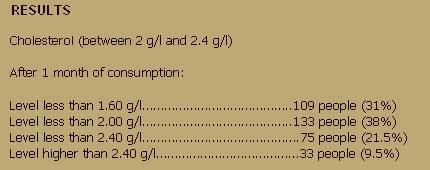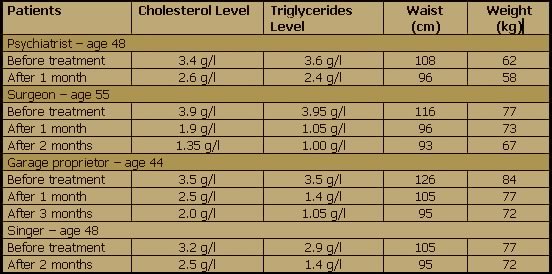Yunnan Tuocha tea has long been known for its medicinal properties and can be highly effective
in reducing cholesterol levels in patients suffering from hypertension and coronary heart disease,
according to a study at Kunming University in southwestern China.
In tests on 86 people over a 2 month period, daily servings of Yunnan Tuocha tea produced results
very similar to the most common Western drug used for lowering blood cholesterol. The findings are
interesting in light of American research which shows that every
1% drop in blood cholesterol level produces a 2% reduction in the risk of a fatal heart attack.

The study verified earlier findings by Professor Bernard Jacotot of Henri-Mondor Hospital in Creteil,
France, who treated 20 patients with high blood lipid levels by serving them 3 times a day with Yunnan
Toucha tea. Jacotot reported
a significant 22% drop in blood fat levels among the patients, while a
control group served with a different tea showed no change at all.
In the Chinese study, conducted by the Department of Internal Medicine at Kunming Medical College in
Yunnan province, 55 patients with abnormally high blood lipid levels were treated with a daily dosage
of 15 grams of Yunnan Tuocha tea divided into 3 daily servings. Another 31 patients received the
standard cholesterol-reducing western drug, called Atromid-S Clofibrate Ethyl P-Cholorophenoxy-Isobutyrate,
or PCIB, again in 3 daily doses of 1/2 gram each, patients ranged in age from 28 to 72 and all were
in the hospital for hypertension or coronary heart disease.
At the end of the two month treatment period, the tea drinking group showed an effective 64.29% reduction
in blood serum cholesterol, compared to a 66.67% reduction for those using PCIB,
the tea was effective in
92.86% of cases, compared with 100% for the PCIB.These studies clearly demonstrated that drinking Yunnan
Tuocha tea regularly lowers blood lipid levels without the side effects of medical drugs.
In 1987, St Antony Medical College of France engaged in observation tests on the medicinal effects of
Yunnan Tuocha tea. The result turned to be highly encouraging. In the same year, Professor Benelle Jacktor
of Henrietee Hospital in Paris of France applied Yunnan Tuocha tea to 20 patients with high blood lipid
level three times a day. After one month, he discovered the blood lipid level of his patients reduced by
a quarter, yet patients taking the same amount of other tea had no change.
A few years later, following a trip to the Yunnan province in China in 1990, Dr Tran Dai-Sy from the
French ARMA Medical Research Association coordinated further research conducted in four European countries
by a team of 16 doctors, of whom ten were acupuncturists, five obesity specialists and one a psychiatrist.
Population Studied
The study focused on a group of 350 people with average cholesterol levels of 3.5 g/l and triglyceride levels
of 2.0 g/l.

The test results clearly show the beneficial effect of Yunnan Tuocha tea in reducing blood cholesterol levels
across the age-group studied.
US Research
Recent research in the USA has indicated that properties found in Yunnan Tuocha tea may be protecting the heart.
"The results were more dramatic than I anticipated," said Dr. Kenneth Mukamal, who led the study, which was
published in May 2002 in the American Heart Association's journal, Circulation.
The heavy tea drinkers in the study - those who drank two or more cups of tea a day - had a 44 percent lower
death rate following their heart attack, compared with nondrinkers. The study found even a benefit in moderate
tea drinkers. Those who drank fewer than 14 cups a week had a 28 percent lower death rate.
In the study, researchers asked 1,900 heart attack survivors about their tea consumption before their heart
problem and followed them for up to four years. Researchers said there's good reason to believe it's the
flavonoids - antioxidants found naturally in various foods derived from plants - that are protecting the heart
by relaxing the blood vessels so blood can flow more easily. There's also evidence to suggest flavonoids may
prevent LDL cholesterol -- the so-called bad cholesterol -- from becoming really bad cholesterol.
The study did not ask patients about decaffeinated tea use, but Mukamal said there's no reason to believe
caffeine makes a difference in the benefit. However, herbal teas would not provide the same benefits since
the chemical makeup is different than that found in black and green tea.
"Ultimately I hope this work will spur on more research so we can find out the exact effect of tea on the heart,"
Mukamal said, "so one day we could give a tea prescription, along with aspirin and other medications following
a heart attack. It seems there are no downsides to drinking tea."
Further Arma Conclusions - Weight Loss
Dr Tran and his team found evidence of other properties just as remarkable, such as weight loss and noticeable
reduction of size for 299 people out of 350:
85% of the cases.
The table below shows the weight loss achieved by
a cross-section of those involved in the study. In all cases, normal diets were maintained with the addition of
a daily intake of Yunnan Tuocha tea.

These results clearly demonstrate the tea's ability to help reduce weight without resort to special dieting or
medical drugs.
Summary
These studies confirm what the Chinese have known for centuries - that Yunnan Tuocha tea provides a natural
alternative to medical drugs for those wishing to lose weight, reduce tension and generally lead a more healthy and relaxed lifestyle.